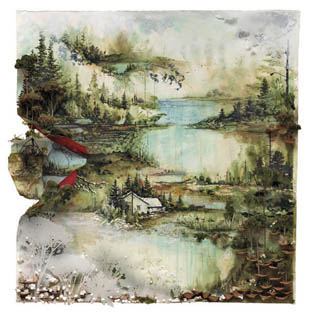Winter Can Only Last So Long
Justin Carroll
Bon Iver, “Bon Iver”
Jagjaguwar Records
2011, 10 tracks, multi-format
 Anyone who has lived in a place like Justin Vernon’s home state of Wisconsin, where winter first hits sometime around Halloween and refuses to leave until Easter, knows winter is a time that can be either peaceful or torturous, depending on the year. For Bon Iver’s first album, “For Emma, Forever Ago,” Vernon set off for the woods of Northern Wisconsin where he spent the long, sunless months of winter and created songs of mourning and reflection. Vernon croons in an unashamed falsetto, usually assisted by his guitar and nothing else. Each song is filled with lament and longing for the people of the past who wouldn’t stop haunting Vernon, and they possessed the kind of brooding, introspective lyrics that come easier to people living in climates that force one to be locked inside for hours. Sure, there’s Internet and television and books, but after all these distractions have been exhausted, you’re left only with thoughts of love gone awry, mistakes that can’t be fixed. Because when the sun’s been gone for months and you can see your breath when standing too close to the kitchen window, good memories don’t visit often.
Anyone who has lived in a place like Justin Vernon’s home state of Wisconsin, where winter first hits sometime around Halloween and refuses to leave until Easter, knows winter is a time that can be either peaceful or torturous, depending on the year. For Bon Iver’s first album, “For Emma, Forever Ago,” Vernon set off for the woods of Northern Wisconsin where he spent the long, sunless months of winter and created songs of mourning and reflection. Vernon croons in an unashamed falsetto, usually assisted by his guitar and nothing else. Each song is filled with lament and longing for the people of the past who wouldn’t stop haunting Vernon, and they possessed the kind of brooding, introspective lyrics that come easier to people living in climates that force one to be locked inside for hours. Sure, there’s Internet and television and books, but after all these distractions have been exhausted, you’re left only with thoughts of love gone awry, mistakes that can’t be fixed. Because when the sun’s been gone for months and you can see your breath when standing too close to the kitchen window, good memories don’t visit often.
In this self-titled second album (also recorded in Northern Wisconsin during winter), Vernon’s added keyboards, thick, full-bodied drums, and layers of electronic ambience which shift Bon Iver’s sound from the dark, desperately nostalgic songs of “For Emma, Forever Ago” to a more spring-like, hopeful sound. Consequently, this incongruous pairing of song styles has an interesting effect: a sort of battle between winter and spring. The complex, multi-layered songs hint to a sense of change, a washing off of the grit and snow of winter and a welcoming to something new after a long spree of gray days.
The instrumentation isn’t the only major change in the new album; Vernon’s lyrics now reveal a desire for something fresh. In “Wash.,” Vernon sings about leaving a state he’s known for a long time: “Climb is all we know when thaw is not below us.” This change in lyrics hints at another kind of spring for Vernon: he’s in music projects galore, all of which are highly acclaimed. (Adele loves him.) The events that tortured him while he spent that first winter up to his armpits in bad memories and icy crusts of snow seem to have left him, at least for now.
This change is welcome—winter gets old, especially for people who live in places where it lasts seven months. Had this second album rehashed the same experiences, feelings, and sounds as the first one, it would’ve come off as tiresome, self-indulgent, and, frankly, whiny. The almost upbeat tracks give the listener exactly what they need: sunlight cracking through the gray sky to remind them that the seasons are bound to change at some point.
Still, winter is a hard thing to shake out of your bones. Songs like “Holocene” and “Calgary” bear a similarity in sound to “Re: Stacks,” from the first album; but even in these soft, melancholic songs, Bon Iver’s lyrics bear the same longing for change as “Wash.” “Calgary,” for instance, starts with Vernon dwelling, again, on love gone wrong: “Don’t you cherish me to sleep … Hair, old, long along / Your neck onto your shoulder blades.” Vernon is still trying to shed the ghost of a lost love, but with more urgency this time around. The whole song is a sort of back and forth between memories and the yearning to be over them, with the last line—”Oh the demons come, they can subside”—suggesting that the road will be a long one, perhaps infinite.
Vernon is beginning to emerge into spring, slowly and authentically. It is a metamorphosis wholly his own; not one encouraged by record company fat cats. The change is one that listeners can feel and appreciate; even those who haven’t felt the inertia of a northern winter can imagine how welcome spring is when it finally arrives.

Justin Carroll survived Montana for eight years. He now lives in Texas with his wife and basset hound. He is an MFA candidate in fiction at Texas State University. His work has been published by Juked, Brink, and Saltgrass.

0 comments on “Review: Carroll”